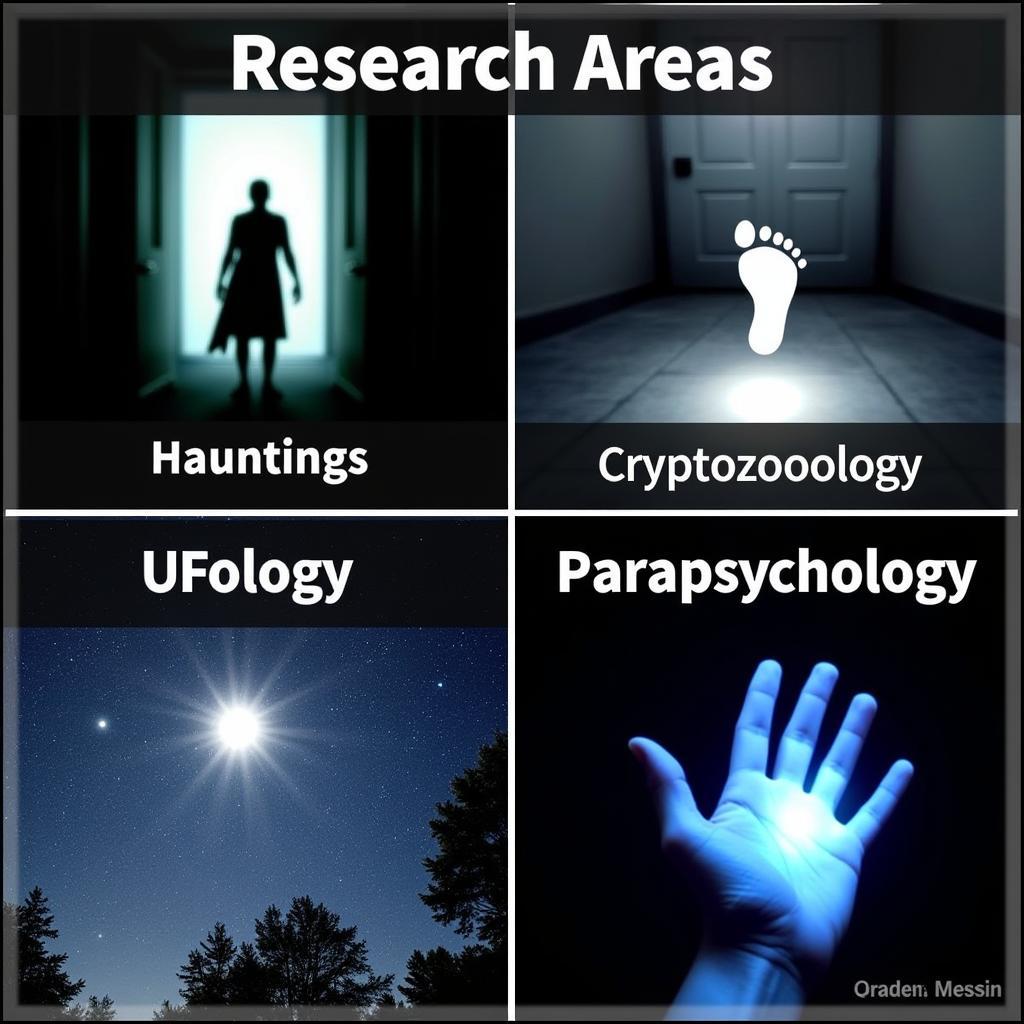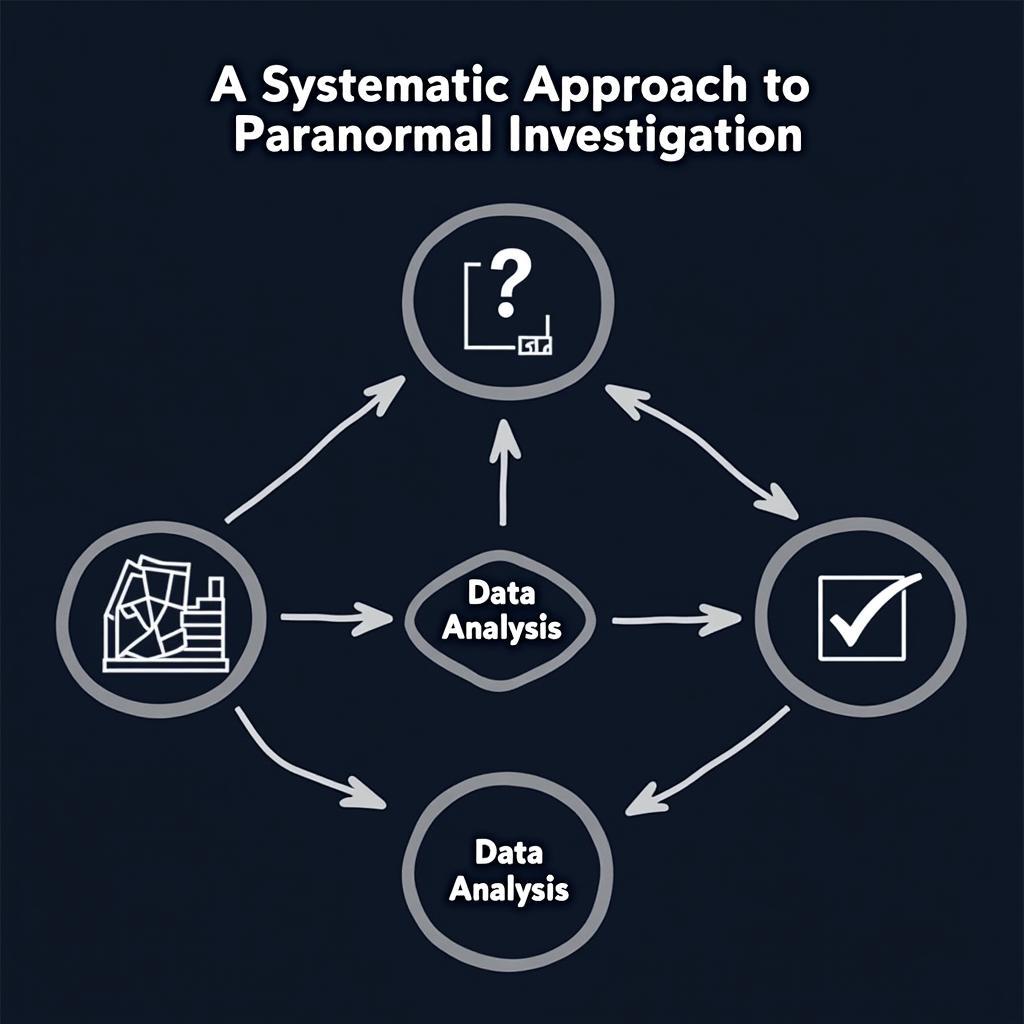The world of paranormal research is vast and complex, encompassing a multitude of phenomena, from ghostly apparitions to unexplained occurrences. A specific “Line Of Research” within this field can mean anything from investigating a particular haunted location to studying a specific type of paranormal activity, like Electronic Voice Phenomena (EVP). Finding your niche and developing a systematic approach is crucial for any aspiring paranormal researcher. This article explores different aspects of choosing and pursuing a line of research in this fascinating field.
Are you drawn to the chilling tales of haunted houses? Perhaps the mysteries of cryptozoology pique your interest? Or maybe you’re fascinated by the possibility of communicating with spirits through EVP? Whatever your passion, establishing a focused line of research is essential for meaningful exploration in the paranormal field. Similar to online accounting research programs, a structured approach is vital.
Choosing Your Paranormal Line of Research
There are countless areas to explore within paranormal research. Some popular lines of research include:
- Hauntings: Investigating reports of ghostly activity in specific locations. This involves collecting evidence like EVPs, photographs, and eyewitness accounts.
- Cryptozoology: The search for creatures whose existence is not proven by science, such as Bigfoot or the Loch Ness Monster. This research often involves fieldwork, tracking, and analyzing physical evidence.
- UFOlogy: The study of Unidentified Flying Objects, analyzing sightings and potential evidence of extraterrestrial life. This can involve researching government documents, interviewing witnesses, and analyzing radar data.
- Parapsychology: The scientific study of psychic phenomena, such as telepathy, clairvoyance, and precognition. This field often employs controlled experiments to test these abilities.
Finding the right line of research is a personal journey. Consider your interests, skills, and available resources. Do you prefer fieldwork, or are you more comfortable with archival research? Are you a tech-savvy investigator, or do you prefer a more traditional approach?
 Exploring Different Paranormal Research Areas
Exploring Different Paranormal Research Areas
Developing a Systematic Approach to Your Research
Once you’ve chosen a line of research, developing a systematic approach is crucial. This involves:
- Formulating a research question: What specific question are you trying to answer? For example, “Is this location haunted?” or “What evidence supports the existence of Bigfoot?”
- Gathering data: This involves collecting evidence relevant to your research question. This could involve fieldwork, interviews, archival research, or experiments. Tools like those mentioned in online qualitative research tools can be adapted to certain lines of Paranormal Research.
- Analyzing data: Once you’ve collected data, you need to analyze it to see what it tells you. This might involve comparing eyewitness accounts, analyzing audio recordings, or examining physical evidence.
- Drawing conclusions: Based on your analysis, what conclusions can you draw about your research question? It’s important to be objective and avoid jumping to conclusions.
“A well-defined line of research provides focus and structure to your investigations,” says Dr. Amelia Blackwood, a prominent parapsychologist. “It allows you to delve deeper into a specific area and contribute meaningfully to the understanding of the paranormal.”
 Systematic Paranormal Investigation Process
Systematic Paranormal Investigation Process
The Importance of Collaboration and Continued Learning in Paranormal Research
Collaboration is vital in any line of research, especially in a field as complex as paranormal investigation. Sharing your findings, discussing theories, and working with other researchers can lead to new insights and discoveries. Similar to how researchers connect in fields like those discussed in research chem reddit, communication is key.
Furthermore, continuous learning is essential. Stay updated on new research, methodologies, and technologies. This will help you refine your approach and contribute to the advancement of paranormal knowledge. You could consider opportunities like those listed on become a researcher online for further development.
“The paranormal field is constantly evolving,” adds Dr. Blackwood. “Staying abreast of new developments is crucial for any serious researcher.”
Conclusion
Choosing a line of research within the paranormal field is the first step towards unraveling the mysteries of the unknown. By adopting a systematic approach and embracing collaboration and continued learning, you can make significant contributions to our understanding of the paranormal. Remember, a well-defined line of research is the key to unlocking the secrets of this intriguing and enigmatic field.
FAQ
- What is a line of research in paranormal investigation? A line of research is a specific area of focus within the broader field of paranormal investigation.
- How do I choose a line of research? Consider your interests, skills, and resources.
- Why is a systematic approach important? It provides structure and focus to your investigations.
- What are some examples of paranormal lines of research? Hauntings, cryptozoology, UFOlogy, and parapsychology.
- Why is collaboration important? Sharing findings and discussing theories can lead to new insights.
For further assistance, please contact us at Phone Number: 0904826292, Email: research@gmail.com, or visit our address: No. 31, Alley 142/7, P. Phú Viên, Bồ Đề, Long Biên, Hà Nội, Việt Nam. We have a 24/7 customer support team.
Explore other articles on our website related to online visual history research and developing your research skills further.